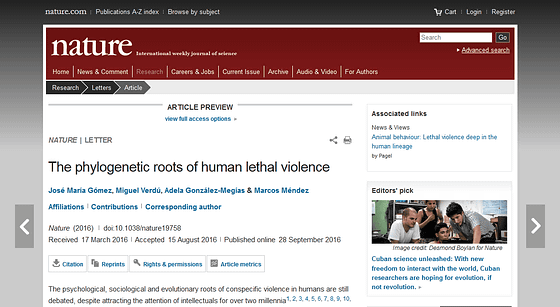Is human homicide rate based on heredity or environment?

By
For centuries, scientists and philosophers have wondered whether the human 'homicide' urge has been inherited from human ancestors or influenced by the environment in which humans live. It is being discussed. Therefore, a study in which a research team at the University of Granada investigated the phylogenetic tree of mammals extensively and calculated the 'murder rate' of humans of each generation is published in Nature.
The phylogenetic roots of human lethal violence | Nature
https://www.nature.com/articles/nature19758

Humans' murder rates explained by primate ancestors, controversial study says | Ars Technica
http://arstechnica.com/science/2016/09/controversial-study-pins-humans-murderous-ways-on-our-primate-ancestors/

Evolutionary biologists at the University of Granada have collected and analyzed more than 4 million 'family killings' records from 1024 mammal species, and found that human 'murder rates' are slightly higher than other mammals, and that of all primates. It turned out to be the same level as compared to. In addition, other than primates, if it is a species that lives in a group, the same degree of 'family killing' is occurring. It seems that territory and social problems are major deciding factors in killing families in the group.
The research team has investigated human homicide rates since 50,000 BC to see if the human 'murder urge' is inherited from their ancestors. Humans have flocked from gathering, hunting and hunting people, forming tribes, building villages, and transforming into a group called a country. The homicide rate has increased significantly with this change, but the time span of this violent change is too fast from a genetic point of view, so the effect of heredity is small, and correction by the environment may be effective. Shows sex.
Looking at mammals as a whole, the 'family killing rate' was about 0.3%, and about 60% of mammals had no record of family killing that would cause fatal wounds. Among mammals, the highest 'family killing rate' was about 19% of meerkats.
The homicide rate for species of human origin is estimated to be about 2%, and the homicide rate for apes is estimated to be about 1.8%. Human beings who were hunter-gatherers were about 2%, but human beings who started to compete with each other by forming groups, races, and countries recorded a murder rate of about 30%. In modern times, the homicide rate has fallen to less than 0.01% due to the establishment of police organizations that crack down on violence and other lawlessness, legal systems and prisons, and strong cultural policies.

By Vector Open Stock
In response to the study, the University of Utah anthropologist Pauline Wiessner said, 'What we have inherited from prehistoric times is very thin,' and human ferocity is not inherited from human ancestors. I affirm the research result. Meanwhile, Harvard anthropologist Richard Wrangham questioned the study by counting all 'murders' together. 'The most common family killing of primates is'infanticide', but humans are the exception of'killing adults of the family',' said Wrangham, the first author of the study. One Jose Maria Gomez admitted that 'the data were not sufficient to elucidate the type of killing.'
Related Posts:







